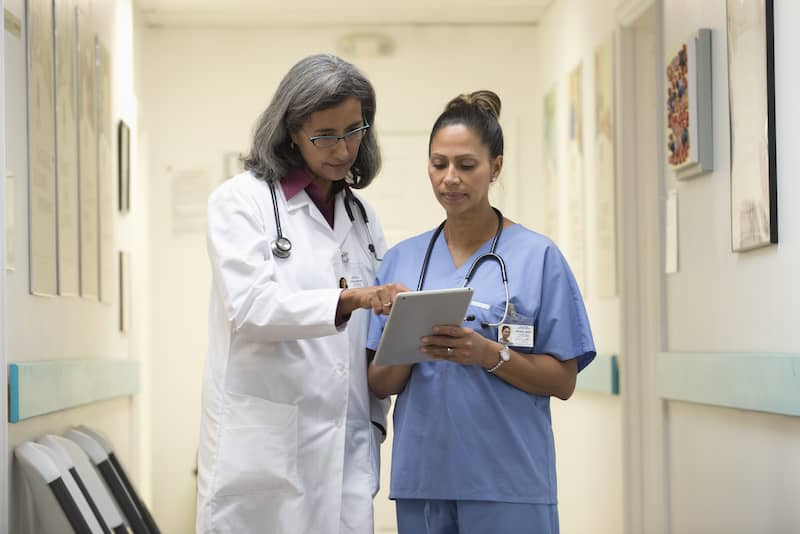Bachelor of Science in Nursing (BSN) Overview

Are you ready to earn your online nursing degree?
 Credit: Wavebreakmedia / iStock / Getty Images Plus
Credit: Wavebreakmedia / iStock / Getty Images PlusAverage Program Length
4 years
Average Credits Required
120
Average Annual Salary
$52,080-$111,220
Source: U.S. Bureau of Labor Statistics, PayScale
According to the American Association of Colleges of Nursing, healthcare settings see a difference in nursing practice based on a nurse’s education level. Employers have a strong preference for bachelor of science in nursing (BSN)-prepared nurses, as they are linked to better patient outcomes. Hospitals seeking Magnet status also prefer to hire graduates of BSN programs.
Nurses benefit from BSN programs for the comprehensive curriculum that teaches more than clinical skills. Students learn critical thinking, decision making, leadership, evidence-based practice, and nursing informatics.
Although salaries depend on many factors, BSN-prepared nurses routinely average more per year than nurses from associate degree in nursing (ADN) programs. Additionally, a BSN prepares the nurse for graduate school and career advancement, factors that contribute to higher earning potential.
A BSN degree may soon become mandatory to practice. In December 2017, New York became the first state to mandate nurses earn a BSN within 10 years of initial licensure.
Earning a BSN increases your credibility with patients and administration. It can also open doors to greater opportunities outside of patient care, including working as an analyst, consultant, case manager, leader, or in sales.
Opportunities With a Bachelor of Science in Nursing
Good career mobility
Path to advancement
Job potential
Skills Learned

Featured BSN Specialties
Beyond working in hospitals as RNs, individuals with a BSN degree find careers as geriatric nurses, OBGYN nurses, and neonatal nurses. Check out the descriptions below to learn more about these specialty occupations.
Registered Nurse
RNs lead teams of nurses to care for patients in clinics, hospitals, and nursing homes. They work the day or night shift to monitor and treat caseloads of patients, including infants, adults, and the elderly. In 16 states, RNs also prescribe medications. An ADN or BSN degree is required to become a registered nurse.
- Salary: $73,300
- Job Outlook: 7% growth from 2019-29
Geriatric Nurse
Geriatric nurses work in nursing care facilities and hospitals to provide medical help to seniors. These professionals have worked as RN nurses and gained clinical experience working with elderly individuals. They have a unique understanding of diseases such as osteoporosis, Alzheimer’s, and dementia.
- Salary: $64,870
- Job Outlook: Positive growth in coming years
OBGYN Nurse
OBGYN nurses provide medical services to women and infants. Under the direction of obstetricians and gynecologists, they deliver care in clinics, private doctor’s offices, and hospitals. They may focus on helping women in various stages of reproduction, including pregnancy, labor, or postpartum.
- Salary: $60,000
- Job Outlook: 7% growth from 2019-29
Travel Nurse
Travel nurses work on a contract basis. High demand areas such as operating rooms, intensive care units (ICU), and emergency rooms need travel nurses across the country. Their assignments last for weeks or months. International work may run as long as two years.
- Salary: $79,000
- Job Outlook: 7% growth from 2019-29
Neonatal Nurse
Neonatal nurses administer care to sick or critically ill infants in the ICU or neonatal intensive care unit. The job includes working with pediatricians and nursing staff, while also providing instructions to parents. Most hold years of experience as RNs, and neonatal nursing certificates.
- Salary: $60,797
- Job Outlook: 7% growth from 2019-29
How Much Will I Make With a Bachelor’s Degree in Nursing?
$32.64
Hourly Salary
$7,123
Monthly Salary
$85,539
Annual Salary
Source: PayScale
How to Get a BSN
1. Decide Type of BSN Program
There are several types of BSN programs, including traditional, bridge, and online. Figure out what works best for you.
2. Find BSN Program
After deciding which factors are important to you in a school, use our degree finder to find programs that fit your criteria.
3. Apply to BSN Programs
Common application requirements include GPA, essay, references, CV or resume, volunteer experience, and prior coursework.
4. Secure funding for BSN programs
There are many ways to finance your degree, including financial aid, grants, scholarships, and loans.
5. Attend BSN classes
Complete the required courses and obtain clinical hours to get hands-on experience. Learn how to work independently with your own patients.
6. Graduate with a BSN
Congrats on earning your degree! Now you can take the NCLEX-RN and become a registered nurse (RN), or continue your education and get your MSN.
Types of Bachelor’s Degrees in Nursing
Admission Requirements for a BSN Program
A BSN applicant’s admission requirements depend on their status as a student. Schools set different criteria and credit requirements for freshmen, transfer students, and international students. However, most BSN degree programs maintain the following common admissions requirements for all students:
- High school or college transcripts
- SAT or ACT scores
- A CV or resume
- A GPA of at least a 2.5 or 3.0
Schools often expect applicants to have completed classes in microbiology, physiology, chemistry, and anatomy. Some institutions may give preference to candidates with volunteer service experience.
Core Concepts in a BSN Program
Bachelor’s of science in nursing programs include two phases: a didactic portion, which is taught in classrooms, and a clinical learning experience. Through lectures and reading assignments, students learn to promote safe solutions and good health, prevent and manage disease, reduce risks, and improve patient outcomes. Candidates gain foundational knowledge through core courses such as:
- Anatomy
- Community health nursing
- Pharmacology
- Leadership and management
- Nursing informatics
- Research and statistics
- Pathophysiology
- Psychology
Upper division courses explore speciality areas such as gerontology, global public health, maternal-child care, and pediatrics.
Clinical & Lab Components in a BSN Program
BSN programs may require students to spend time in a hospital, clinic, or lab stimulation setting in which they work an actual shift. During clinical experiences, candidates work under licensed RN mentors as they deliver medications, assess and diagnose patients, plan interventions, and monitor outcomes. By the end of the program, students can work independently with their own patients. Clinicals offer the opportunity to:
- Shadow working RNs
- Apply classroom skills on patients
- Network with future employers
- Build confidence
What to Expect From an Online RN-to-BSN Program
Students earning their RN-to-BSN or second degree BSN have the option of attending an online program instead of traditional face-to-face classes. Online RN-to-BSN degrees let students take core classes in anatomy, pharmacology, and psychology remotely. While distance learners do not have to meet on campus for their foundational courses, they must complete clinicals or labs in their local communities. During a program’s clinical component, students work in labs or at their local hospitals, clinics, or nursing care facilities. Students are often required to find their own clinical experiences.
Nothing, aside from the format, differentiates online degrees from traditional programs. Online learners receive the same degree and education, learning from professors who work on campus. Instructors use online learning platforms to meet live with students or assign online work.
Learn more on this page about how online programs work.
Should I Get a Bachelor’s Degree in Nursing?
Your personal financial situation, time constraints, and family obligations may impact your decision to pursue a 4-year degree. Take a look at the pros and cons of pursuing a bachelor’s degree in nursing:
Advantages to a BSN
Greater career mobility. Most administrative and supervisory positions require a BSN.
Grants entry to master’s or doctoral nursing programs, leading to career advancement and higher salaries.
The critical thinking skills imparted by a BSN translate to improved patient care and safety.
Disadvantages to a BSN
Baccalaureate study means that candidates spend four years in a program before generating income.
Tuition for four years is significantly more expensive than for two, and often means additional years of student debt.
In nursing positions that do not require a bachelor’s degree in nursing, a BSN does not necessarily equate to a higher starting salary.
Explore BSN Programs
Are you ready to earn your online nursing degree?
Whether you’re looking to get your pre-licensure degree or taking the next step in your career, the education you need could be more affordable than you think. Find the right nursing program for you.







